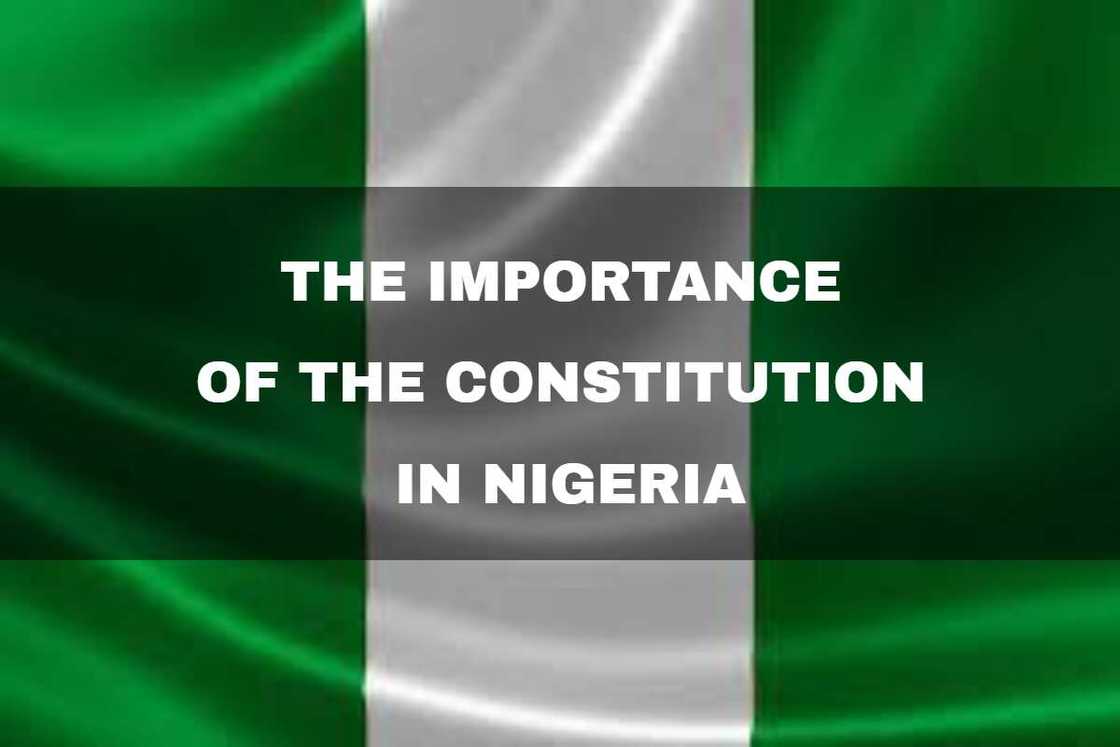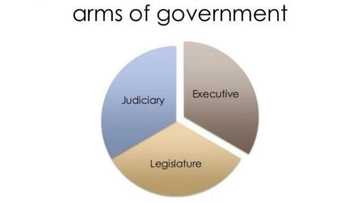What is the importance of the constitution in Nigeria? Be in the know
A constitution is a set of principles determining how the government should manage a country’s affairs and defines the operational boundaries of all government organs. Discover the importance of the constitution in Nigeria from this article.

Source: Facebook
A country without a constitution is bound to plunge into chaos and instability. The absence of a constitution creates a disconnection between the citizens and the state. The people find it difficult to rely on the government because they cannot make it accountable for anything. Hence, the country might experience many conflicts in the long run.
Five importance of the constitution in Nigeria
The 1999 Nigerian Constitution (fourth republic constitution) is the supreme law of Nigeria. It follows the four legal systems in Nigeria (English law, Customary law, Common law, and Sharia Law). English law is derived from colonial Nigeria, while Common law developed post-colonial independence. Below are five main benefits of the Nigerian constitution:

Read also
2023: Why zoning, experience, others should be a factor in Akwa Ibom politics by Godwin Edoho
1. The constitution protects human rights and freedoms
The primary function of the constitution of Nigeria is to protect the freedom and rights of everyone living within the boundaries of Nigeria (citizens and foreigners). Some of the fundamental human rights outlined in the constitutions of Nigeria are:
- Right to life.
- Right to personal liberty.
- Right to dignity.
- Right to privacy.
- Right to a fair hearing.
- Right to freedom of expression.
- Right to freedom of assembly.
- Right to freedom from discrimination.
- Right to freedom of thought, conscience and religion.
- Right to freedom of movement within Nigeria.
- Right to acquire and own immovable property anywhere in Nigeria.
The constitution of Nigeria outlines the process of obtaining Nigerian citizenship and how to renounce it. Apart from focusing on the rights of the citizens, the constitution states the duties of citizens to their nation.

Source: UGC
2. It prevents the government and its officials from abusing power
Another importance of the constitution in Nigeria is that it prevents leaders and the government from abusing power. For instance, it sets out the process of removing every government official from power, including how to impeach the president and officials at all state levels.
The 1999 Constitution of Nigeria also protects people and institutions from abuse of power through the Public Complaints Commission Act, the National Youth Service legislation, the National Securities Agencies Act, the Land Use Act, etc.
3. The constitution specifies the functions of the arms of government
The constitution explains how the three arms of government, legislature, judiciary, and executive, should coordinate. It defines each arm's functions, responsibilities, and limitations to prevent them from overriding each other.
4. The constitution of Nigeria promotes democracy
The 1999 Constitution of Nigeria inscribes socialism, territorial unity, and national integration into a country's leadership. It explains the process for registering or deregistering political parties and has laid down all government officials' election and appointment processes, including the president.
According to the constitution, one must be 35 years old or more to run for a senatorial or gubernatorial seat, at least 30 years to be a member of the House of Representatives, and 40 years or more to vie for presidential office.

Source: UGC
5. It contains laws that promote economic development in the country
The fifth importance of the constitution in Nigeria on this list is that it determines how the government should exploit, manage, and conserve available resources, including the natural environment.
Laws in Nigeria determine how businesses operate within the country, and favourable government policies attract local and foreign investors. Tax laws ensure the government collects enough revenues, and other laws state how it should spend it for the people's interest.
Nigeria is among the countries with the highest GDP in Africa despite it being among the most corrupt countries worldwide. The constitution can help it overcome its current economic challenges by improving laws that promote economic growth.
History of the constitution of Nigeria
Nigeria's first constitutions were during the colonial era (1914–1960). The Clifford Constitution was established in 1922, the Richards Constitution in 1946, the Macpherson Constitution in 1951, and the Lyttleton Constitution in 1954.
On October 1, 1960, a British Order-in-Council enacted Nigeria's first constitution as a sovereign state. It made Nnamdi Azikiwe the Governor-General representing the head of state, Queen Elizabeth II (the Queen of Nigeria).
The second constitution of independent Nigeria was established on October 1, 1963, when the former Governor-General, Nnamdi Azikiwe, became the first President of Nigeria. It was in operation until the 1966 military coup.
The 1979 constitution created the second republic of Nigeria, while the 1993 constitution of the third republic restored democratic government.
Nigeria uses the 1999 constitution of the fourth republic, which reinforces democratic rule. President Goodluck Jonathan signed only three amendments in 2011 since the document came into use.

Source: UGC
What are the five purposes of the constitution?
If asked to outline the importance of the constitution in Nigeria, list these five points:
- The constitution protects human rights and freedoms.
- It prevents the government and its officials from abusing power.
- The constitution specifies the functions of the arms of government.
- The constitution of Nigeria promotes democracy.
- It contains laws that promote economic development in the country.
What are the types of constitutions in Nigeria?
Nigeria has implemented several constitutions before and after the British colonial era. Military coups led to the enactment of some post-colonial constitutions. Below is a list of constitutions that have been in Nigeria:
- The colonial era (1914–1960) constitutions, The Clifford Constitution (1922), the Richards Constitution (1946), the Macpherson Constitution (1951), and the Lyttleton Constitution (1954).
- The 1960 constitution was enacted by the British Order-in-Council after Nigeria's independence.
- The 1963 constitution when Nnamdi Azikiwe become the first President of Nigeria.
- The 1979 constitution created the second republic of Nigeria.
- The 1993 constitution of the third republic of Nigeria.
- The 1999 constitution of the fourth republic of Nigeria is currently in use.
The importance of the constitution in Nigeria cannot be overlooked. The 1999 constitution is not perfect but has generated a commendable level of coordination between the government and the citizens. Legal practitioners believe the 1999 constitution needs to be amended to deal with federalism, its most contradicting part.
READ ALSO: 10 problems of road transportation and solutions in Nigeria
Legit.ng also delved into road transportation problems in Nigeria and solutions. Businesses and people heavily rely on road transport for daily use.
People hope the government will improve the state of road transportation in the country because some alternative means of transport are too expensive for personal or business use.
Source: Legit.ng

Peris Walubengo (Lifestyle writer) Peris Walubengo has vast experience in search engine optimization through digital content generation, research, editing, and proofreading. She joined Legit.ng in April 2022 and completed the AFP course on Digital Investigation Techniques. You can email her at perisrodah254@gmail.com.

Adrianna Simwa (Lifestyle writer) Adrianna Simwa is a content writer at Legit.ng where she has worked since mid-2022. She has written for many periodicals on a variety of subjects, including news, celebrities, and lifestyle, for more than three years. She has worked for The Hoth, The Standard Group and Triple P Media. Adrianna graduated from Nairobi University with a Bachelor of Fine Arts (BFA) in 2020. In 2023, Simwa finished the AFP course on Digital Investigation Techniques. You can reach her through her email: adriannasimwa@gmail.com






